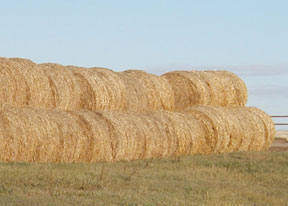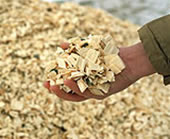ABOUT US
Pennsylvania Fuels for Schools and Communities is a statewide energy-use initiative aimed at promoting the use of local wood and biomass resources to provide reliable energy for Pennsylvania schools, communities and businesses. Our main tasks are education, financial analysis support, and technical assistance. Physically, the initiative consists of a collaborative partnership of organizations and private groups that meet together regularly and work together towards the common goal of efficient, sustainable, and economical use of renewable wood and biomass energy in the state.
 Energy from Wood
Energy from Wood
Wood for energy can come from a number of sources, such as:
- urban or construction site wood
- wood residues left over after a timber harvest
- residues from wood manufacturing
- dedicated energy crops, and
- wood from timber stand improvement activities (i.e. thinnings)
Wood fired systems are currently a viable alternative when installed in schools, offices, prisons or greenhouses. Such projects can save substantial money on fuel, when compared to the price of fossil fuel. Combined heat and power systems generate electricity to offset power costs and can power air conditioning systems during the summer.
Energy from Biomass
Large quantities of biomass can be grown specifically for energy purposes on Pennsylvania farms. High yielding, native grasses and short rotation woody crops are becoming profitable crops for farmers, while providing many environmental benefits and a locally grown fuel source for their communities. Much of the agricultural land base in Pennsylvania, while only marginally suited for traditional row crop production, is well suited for biomass crop production.
 Economics
Economics
As a locally produced fuel, wood chips are more economical to burn than fossil fuels. Biomass heating systems also avoid price volatility associated with natural gas and oil. Modern wood burning systems require less than 30 minutes of maintenance per day. Locally generated wood can be used near the source, thus minimizing the cost of labor for transport. Collectively, wood fired systems can become part of the support structure for local economies through job creation and energy cost savings.
Pennsylvania Fuels for Schools and Communities estimates that when fuel oil is $2.00/gallon and wood costs $50.00/ton, using wood fuel instead of fuel oil reduces energy costs by nearly 75%, making wood fuel systems very economically sensible. During the 2006 heating season, the Mountain View School District in Susquehanna County saved $114,000 by heating with wood chips instead of fuel oil, and the Elk Regional Health Center saved $300,000 over the cost of natural gas. Ultimately, all of the money spent on biomass heat is returned to the local economy.
Operation
Biomass systems can be designed to meet the needs of the user and the available fuel sources. Biomass systems can use green, dry or blended fuels. System maintenance varies from a half hour to one hour per day, depending on the level of automation. Biomass systems use computerized delivery systems that automatically move fuel from the stockpile, bin or hopper to the boiler, according to the energy needs of the system.
Developing a fuel inventory usually allows for the storage of a supply to cover periods of weather not suitable for delivery. Some facilities allow for delivery of large quantities at the best prices.
In addition to schools, wood fuel systems make sense in other buildings such as hospitals, offices and prisons. Wood manufacturing facilities routinely take advantage of the wood residues they generate as a fuel source for process and facility heat. Greenhouse systems, like the one installed at Dillon Floral in Bloomsburg, provide economic savings on energy costs to heat the greenhouses.
 Environmental
Environmental
When timber is harvested from forests, secondary waste wood can be sustainably removed and converted to wood chips to be used as an energy source. Some waste wood is left behind for ground cover until forest regeneration begins and to provide wildlife habitat, soil nutrients, and organic matter. Care must be taken to prevent over-harvesting and maintain our forestlands as a renewable resource.
Growing native grasslands for energy can return many benefits to the local and regional environment. Native grasslands protect the integrity of our soil and water resources for future generations, while providing high quality habitat to many species of wildlife. In addition, these crops can greatly reduce the amount of fuel, fertilizers, and pesticides farmers need to use annually to produce a profitable crop on their farms. Simply put, native grasslands are one of the most efficient, environmentally friendly crops that can be grown on farmland and transformed into a wide variety of truly green fuels for consumers.
Modern biomass burners are clean burning and meet current air emission standards. Biomass is a renewable resource that is essentially carbon neutral and reduces greenhouse gases which contribute to global warming.
Funding Sources
Numerous sources of funding assistance exist for biomass energy systems in Pennsylvania for schools, institutions, greenhouses or other businesses. Both state and federal programs have grant and loan opportunities available at certain times during the year.
- The Pennsylvania Department of Environmental Protection offers the PA Energy Development Authority (PEDA) grant program, one sources of funding for renewable energy projects.
- The Department of Community and Economic Development (DCED) offers the Manufacturers Equipment Loan Fund (MELF) and the Alternative Clean Energy (ACE) grant for the handling of biomass fuels and the installation and purchase of biomass boilers.
- The USDA Rural Development Program also provides funding to municipalities with fewer than 50,000 residents, which qualifies most areas of Pennsylvania. The USDA US Forest Service is another potential source for funding.
Additional funding sources and special loan programs are currently under development to provide financial assistance. The economic savings of these biofuel systems make these projects a sound business option for schools, businesses and communiteis looking to reduce energy costs and maintain profitability.


